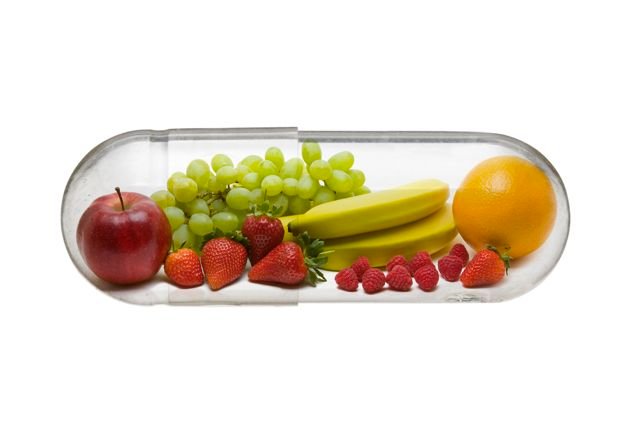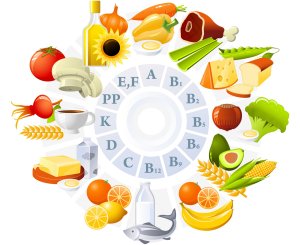When you're expecting, you are more cautious and aware of your food intake. You want to make sure your growing baby is getting all the vitamins she needs. I was pretty much glued to my phone, constantly checking if certain foods are okay to eat, which fish I can consume and how much, etc. Your prenatal vitamin will cover what the little one needs for her growth and development, but it's always good to know where else to find them.
I took my time to read and research about all the vitamins a healthy pregnancy needs and made sure I was adding those foods to my diet.

Here's an overview of the vitamins and what foods contain them:
Vitamin A: essential for baby's growth and development of cells, bones, teeth, skin, eyes and immunities. You'll get vitamin A from dairy and other animal products, spinach, kale, leafy greens, broccoli, orange and yellow veggies and fruits (carrots, squash, sweet potatoes, pumpkins - and mangoes, apricots, cantaloupe), red pepper, oatmeal and whole grains.
Vitamin B1 (thiamin): essential for regulating the supply of carbohydrates to your baby and important for brain development, aids in the production of red blood cells and overall in the functioning of the nervous system. Good sources include oatmeal, wheat germ, raisins, cauliflower , corn, beans, nuts and sunflower seeds.
Vitamin B2 (riboflavin): this vitamin helps release energy from fats, proteins and carbs; and also aids in cell division, growth and repair of tissues (think skin). Find this vitamin in milk, yogurt, cottage cheese, eggs, chicken, liver, mushrooms, peas and beans.
Vitamin B3 (niacin): essential for your blood flow and the circulation of nutrients to your baby. Foods include: meats, fish, chicken, veal, lamb, salmon, mushrooms and peanuts.
Vitamin B6 (pyridoxine): helps the body use protein to build tissue, adequate intake reduces the risk of neural tube defects and helps form red and white blood cells. It also helps reduce morning sickness symptoms. You'll get this vitamin from brown rice, soybeans, oatmeal, chicken, beef, veal, lamb, potatoes, tomatoes, spinach , avocado, bananas and watermelon.
Vitamin B7 (biotin): Biotin does not only help women have beautiful skin, hair and nails, but actually is also involved in the production of amino acids and in the replication of DNA. You'll find this vitamin in nuts, eggs, soybeans, mushrooms, peas, avocados, milk, bananas, cauliflower and whole grains.
Vitamin B12: Important for the formation of red blood cells, for building genetic material and for development and functioning of the nervous system. The only natural dietary sources are animal products - meat, eggs, dairy and fish.
Choline: Part of the family of B vitamins. Essential for fetal brain and neural tube development and for learning and memory. Sources include peanuts, eggs, broccoli, cauliflower, wheat germ, soybeans and meats.
Folate (Folic Acid): Another B vitamin, one that is crucial in preventing neural tube defects (spina bifida) in the fetus in the first trimester. Folate also aids in cell division and red blood cell formation. It is recommended to consume 600 mcg of folic acid before, during and after pregnancy. Good sources: avocados, bananas, orange and grapefruit juice, asparagus, leafy greens (spinach and kale!), lentils, peas, beans and most grain products.
Pantothenic Acid: important for metabolism of fats, carbs and proteins. Regulates body's adrenal activity, aids in wound healing and antibody production. You'll find this in meats, milk, eggs, oranges, potatoes, broccoli, whole grains and leafy greens.
Vitamin C: The list is long, but we have all heard that vitamin C is important since we've been kids. Here to name just a few that are related to growing a baby: aids in the production of collagen, the protein that gives strength and structure to developing baby's cartilage, muscles, blood vessels and bones. Find it in oranges, citrus fruits, broccoli, asparagus, brussels sprouts, red and green pepper, kale, tomatoes, sweet potatoes, cantaloupe, apples, cranberries, strawberries, peaches, papaya, watermelon, kiwifruit,...
Vitamin D: Essential for bone structure. It's important to get enough Vitamin D, to help strengthen your baby's bones and maintain your calcium, otherwise the baby will drain it from you which could lead to rickets (a softening of the bones). Unfortunately, this vitamin is not found in many foods, so adding a supplement, getting some sunlight and consuming vitamin D fortified foods should help you get the recommended daily intake of 400 IU. Some good sources: fortified milk and juices, sardines and egg yolk.
Vitamin E: this vitamin helps ward off cell-membrane damage. Vitamin E is also great for healthy skin as it helps maintain its moisture and elasticity. Too much vitamin E can be dangerous, so be sure to get this vitamin only from your prenatal supplement and food sources, such as sweet potatoes, avocados, spinach, asparagus, mangoes, prunes, nuts and sunflower seeds.
Vitamin K: This vitamin is essential for blood clotting and prevents excess blood loss after injuries. Vitamin K also helps maintain healthy bones and heal bone fractures. If you're taking a Calcium supplement, you'll most likely find vitamin K in it as well. Good sources include canola and olive oil, leafy greens (Kale!), oatmeal, green apples, asparagus, avocado, blueberries and bananas.
*note: you should not take calcium and iron supplements at the same time as they interfere with the absorption of one another

Prenatal supplements pretty much contain all of the above mentioned vitamins, but many different brands have different amounts of each of them. Most important is that you get 600-800 mcg of folic acid.
The Prenatal vitamins I took up until about 24 weeks was Centrum Specialist Prenatal, then they made me feel nauseous and I switched to One A Day. Gummies are great too, but I definitely like the ones that are prenatal+DHA.
xTanya
Excellent post, Can you please take a look at my article Google = 666, they are hiding the damage being caused to children by vaccines.
https://steemit.com/@jjyeshua
Thanks. This is great and i am sure this will improve the chance of happy baby. I would also suggest beside the food intaking, one should also focus having quality and enough rest and also calm mind and this would also help to have a happy baby too.
I don't think that nutrition will deliver you a happy baby, but it will definitely deliver a healthy baby. But I agree that expecting mothers should try to find time for themselves, to relax and wind down and be as stress-free as possible. When a mother is happy, the baby will be happy too. x